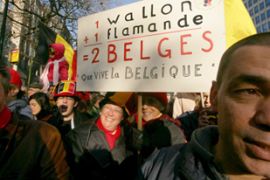Belgian PM offers to quit
Government fails to resolve autonomy issues involving different linguistic groups.

People in the streets of Brussels, Belgium’s capital, expressed their concern on Tuesday.
“I’ve been worried for a year now and the worries just increase day after day. I don’t see how we could get out of that crisis on short term, apart from an anticipated election,” said a French speaker in the Belgian capital.
“It’s a difficult situation we are in now, Belgium is in a situation we have never faced before, but we will see what the near future will bring,” said a Dutch speaker adding, “I’ll hope the best for Belgium because I don’t think a separate way is the best way for Belgium.”
Leterme offered King Albert the resignation of his government late on Monday after he acknowledged he would not make a Tuesday deadline for a constitutional reform deal despite months of talks.
He said in a statement that it was “impossible to bridge” the differences between Dutch and French speaking parties.
Didier Reynders, the vice-premier, called for Leterme to stay on, adding he had not lost trust or faith in the ability to reach a deal between political factions.
Fractious government
Leterme’s government, a fractious alliance of Christian democrats, socialists, liberals and nationalist hardliners from both sides of Belgium’s linguistic divide, took office on March 20.
He has sought to defuse the tensions that have loomed over this country of 6.5 million Dutch-speakers and four million Francophones for more than a year.
Flemish parties want the prosperous Dutch-speaking north to be more autonomous by shifting taxes and some social security measures from the federal to the regional level.
They also want more self-rule in transport, health, labour market and justice areas.
Francophone parties say enough powers have been devolved since the mid-1980s and accuse Dutch-speakers of trying to cut loose the Wallonia area where the economy lags with a 15 per cent jobless rate, triple that of Flanders.
Belgian politics have long been overshadowed by linguistic disputes, but the latest bout of linguistic squabbling has given the debate a hostile tone and triggered calls in Dutch-speaking Belgium for the break-up of the country that became independent of the Netherlands in 1830.
Complicating matters greatly this time is a 2003 court ruling invalidating the borders of a voting district that comprises Brussels and 20-odd Flemish towns near the capital, which is officially bilingual but overwhelmingly Francophone.
Francophones oppose a redrawing of the district unless Brussels absorbs some Flemish suburbs where they have support from Francophone residents.
Dutch-speaking politicians ridicule the notion of a 20-kilometre “Francophone corridor” linking Wallonia to Brussels which is now an enclave in Dutch-speaking Belgium.
Mainstream Flemish politicians say there is room for more regional autonomy without breaking up Belgium, but polls indicate they are losing ground to more hardline parties in Flanders that openly advocate the break-up of Belgium.